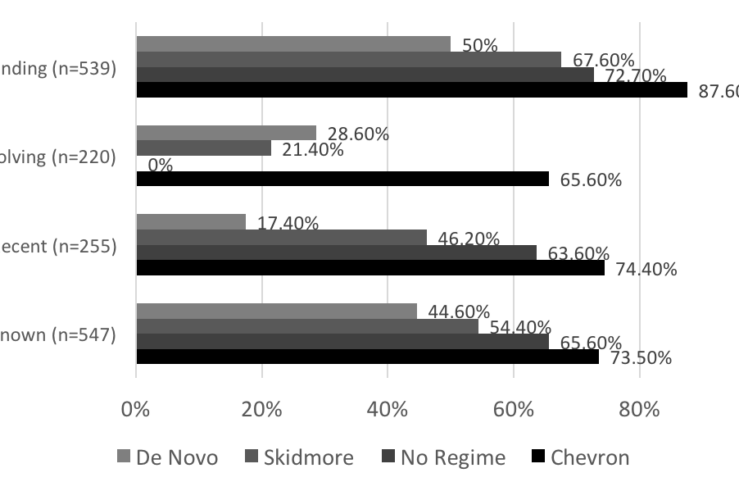Chevron and the Politicization of Law (or, Chevron Step Three)
A recent exchange between Chris Walker and Philip Hamburger about Walker’s ongoing empirical work on the Chevron doctrine (the idea that judges must defer to reasonable agency interpretations of ambiguous statutes) gives me a long-sought opportunity to discuss what I view as the greatest practical problem with the Chevron doctrine: it increases both politicization and polarization of ... Chevron and the Politicization of Law (or, Chevron Step Three)
Closing the Rural Digital Divide Requires Understanding the Rural Digital Divide
I had the pleasure last month of hosting the first of a new annual roundtable discussion series on closing the rural digital divide through the University of Nebraska’s Space, Cyber, and Telecom Law Program. The purpose of the roundtable was to convene a diverse group of stakeholders — from farmers to federal regulators; from small ... Closing the Rural Digital Divide Requires Understanding the Rural Digital Divide
Soylent Analytica: The Graph is too Damn Open
The world discovered something this past weekend that the world had already known: that what you say on the Internet stays on the Internet, spread intractably and untraceably through the tendrils of social media. I refer, of course, to the Cambridge Analytica/Facebook SNAFU (or just Situation Normal): the disclosure that Cambridge Analytica, a company used ... Soylent Analytica: The Graph is too Damn Open
Our amicus brief supporting en banc review of the court’s Open Internet Order decision
Last week the International Center for Law & Economics and I filed an amicus brief in the DC Circuit in support of en banc review of the court’s decision to uphold the FCC’s 2015 Open Internet Order. In our previous amicus brief before the panel that initially reviewed the OIO, we argued, among other things, that In order to justify ... Our amicus brief supporting en banc review of the court’s Open Internet Order decision
Manufacturing (Broadband) Dissent
I have a new post up at TechPolicyDaily.com, excerpted below, in which I discuss the growing body of (surprising uncontroversial) work showing that broadband in the US compares favorably to that in the rest of the world. My conclusion, which is frankly more cynical than I like, is that concern about the US “falling behind” ... Manufacturing (Broadband) Dissent
Some historical observations about Network Neutrality
I have a new post up at TechPolicyDaily that takes a historical perspective on Network Neutrality. The abstract is below. I had to cut a bunch out of the piece — I hope to add a bunch of the cut parts back in and post an extended version here later this week. But for now: Network ... Some historical observations about Network Neutrality
On Debating Imaginary Felds
Harold Feld, in response to a recent Washington Post interview with AEI’s Jeff Eisenach about AEI’s new Center for Internet, Communications, and Technology Policy, accused “neo-conservative economists (or, as [Feld] might generalize, the ‘Right’)” of having “stopped listening to people who disagree with them. As a result, they keep saying the same thing over and over again.” (Full disclosure: ... On Debating Imaginary Felds
Of Cake and Netflix
My new FSF Perspectives piece, Let Them Eat Cake and Watch Netflix, was published today. This piece explores a tension in Susan Crawford’s recent Wired commentary on Pew’s 2013 Broadband Report. I excerpt from the piece below. You can (and, I daresay, should!) read the whole thing here. In her piece, after noting the persistence ... Of Cake and Netflix
Ronald Coase, 1910-2013
Many more, who will do far more justice than I can, will have much more to say on this, so I will only note it here. Ronald Coase has passed away. He was 102. The University of Chicago Law School has a notice here. The first thing I wrote on the board for my students this ... Ronald Coase, 1910-2013
Of Common Law and Common Sense: Children’s Consumer Product Safety Commission vies for National Nanny Title
With thanks to Geoff and everyone else, it’s great to join the cast here at TOTM. Geoff gave a nice introduction, so I won’t use this first post to further that purpose – especially when I have substance to discuss. The only prefatory words I’ll offer are that my work lies at the intersection of ... Of Common Law and Common Sense: <del>Children’s</del> Consumer Product Safety Commission vies for National Nanny Title
Gus Hurwitz on A Policy Statement Is Not Enough
Administrative law really is a strange beast. My last post explained this a bit, in the context of Chevron. In this post, I want to make this point in another context, explaining how utterly useless a policy statement can be. Our discussion today has focused on what should go into a policy statement – there ... Gus Hurwitz on A Policy Statement Is Not Enough
Gus Hurwitz on the Application of Chevron to Section 5
Introduction This post is based upon an in-progress article that explores the applicability of Chevron deference to FTC interpretations of Section 5’s proscription of unfair methods of competition. ( I am happy to circulate a draft of this article to anyone who would like to offer substantive feedback.) The article is prompted by the near-universal belief in ... Gus Hurwitz on the Application of Chevron to Section 5






